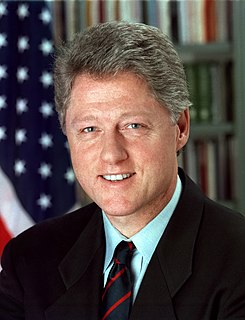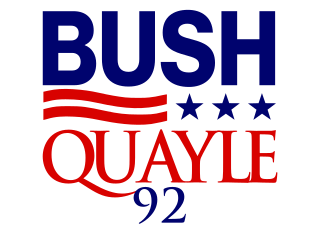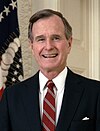Related Research Articles

George Herbert Walker Bush was an American politician, diplomat, and businessman who served as the 41st president of the United States from 1989 to 1993. A member of the Republican Party, Bush also served as the 43rd vice president from 1981 to 1989 under Ronald Reagan, in the U.S. House of Representatives, as U.S. Ambassador to the United Nations, and as Director of Central Intelligence.

The 1992 United States presidential election was the 52nd quadrennial presidential election, held on Tuesday, November 3, 1992. Democratic Governor Bill Clinton of Arkansas defeated incumbent Republican President George H. W. Bush, independent businessman Ross Perot of Texas, and a number of minor candidates. This election marked the end of a period of Republican dominance that began in 1968. This was the last election until 2020 in which the incumbent president failed to win reelection.

Henry Ross Perot was an American business magnate, billionaire, and philanthropist. He was the founder and chief executive officer of Electronic Data Systems and Perot Systems. He ran an independent presidential campaign in 1992 and a third-party campaign in 1996, establishing the Reform Party in the latter election. Although he failed to carry a single state in either election, both campaigns were among the strongest presidential showings by a third party or independent candidate in U.S. history.

Chester James Carville Jr. is an American political consultant and author who has strategized for candidates for public office in the United States, and in 23 nations abroad. He is also a media personality with expertise in U.S. elections who continues to appear frequently on cable news programs, in podcasts, and in his public speeches.

Harvey LeRoy "Lee" Atwater was an American political consultant and strategist for the Republican Party. He was an adviser to US presidents Ronald Reagan and George H. W. Bush and chairman of the Republican National Committee. Atwater aroused controversy through his aggressive campaign tactics, especially the Southern strategy.

Mary Joe Matalin is an American political consultant well known for her work with the Republican Party. She has served under President Ronald Reagan, was campaign director for George H. W. Bush, was an assistant to President George W. Bush, and counselor to Vice President Dick Cheney until 2003. Matalin has been chief editor of Threshold Editions, a conservative publishing imprint at Simon & Schuster, since March 2005. She is married to Democratic political consultant James Carville. She appears in the award-winning documentary film Boogie Man: The Lee Atwater Story and also played herself, opposite her husband, James Carville, John Slattery, and Mary McCormack in the short lived HBO series K Street.
Gennifer Flowers, nicknamed "Buffles" by schoolmates, is an American author, singer, model, actress, and former TV journalist. In January 1998, President Bill Clinton testified under oath that he had had a sexual encounter with Flowers.

The War Room is a 1993 American documentary film about Bill Clinton's campaign for President of the United States during the 1992 United States presidential election. Directed by Chris Hegedus and D. A. Pennebaker, the film was released on December 5, 1993.

Paul Edward Begala is an American political consultant and political commentator, best known as the former adviser to President Bill Clinton.

The 1992 presidential campaign of Bill Clinton, then Governor of Arkansas, was announced on October 3, 1991 in Little Rock, Arkansas. After winning a majority of delegates in the Democratic primaries of 1992, the campaign announced that then-junior Senator from Tennessee, Al Gore, would be Clinton's running mate. The Clinton-Gore ticket went on to defeat Republican incumbent President George H. W. Bush and Vice President Dan Quayle in the presidential election on November 3, 1992, and took office as the 42nd President and 45th Vice President, respectively, on January 20, 1993.

"Read my lips: no new taxes" is a phrase spoken by American presidential candidate George H. W. Bush at the 1988 Republican National Convention as he accepted the nomination on August 18. Written by speechwriter Peggy Noonan, the line was the most prominent sound bite from the speech. The pledge not to tax the American people further had been a consistent part of Bush's 1988 election platform, and its prominent inclusion in his speech cemented it in the public consciousness. The impact of the election promise was considerable, and led to a fifteen-point bounce in a Gallup poll.
The United States presidential election debates were held in the 2004 presidential election. Three debates were held between Republican incumbent George W. Bush and Democratic candidate John Kerry, the major candidates, and one debate was held with their vice presidential running mates, incumbent Dick Cheney and John Edwards. All four debates were sponsored by the non-profit Commission on Presidential Debates (CPD), which has organized presidential debates since its establishment in 1987.
"The economy, stupid" is a phrase coined by James Carville in 1992. It is often quoted from a televised quip by Carville as "It’s the economy, stupid." Carville was a strategist in Bill Clinton's successful 1992 presidential campaign against incumbent George H. W. Bush. His phrase was directed at the campaign's workers and intended as one of three messages for them to focus on. The others were "Change vs. more of the same" and "Don't forget health care."

In 1992, Ross Perot ran unsuccessfully as an independent candidate for President of the United States. Perot was a Texas industrialist who had never served as a public official, but he had experience as the head of several successful corporations and had been involved in public affairs for the previous three decades. Grass-root organizations sprang up in every state to help Perot achieve ballot access following his announcement on the February 20, 1992 edition of Larry King Live. James Stockdale, a retired Navy vice admiral, was Perot's running mate.
Robert B. Barnett is an American lawyer who is a partner at the law firm Williams & Connolly.

The 1992 United States presidential election in New Hampshire took place on November 3, 1992, as part of the 1992 United States presidential election. Voters chose four representatives, or electors to the Electoral College, who voted for president and vice president.
In late October 2012, the post-tropical cyclone once known as Hurricane Sandy made landfall in New Jersey. By the time it made landfall, it had merged with other storm systems. Though no longer a hurricane, the combined storm caused over $50 billion in damages and cost over 100 lives in the United States.

The 2016 United States presidential election in Michigan was held on Tuesday, November 8, 2016, as part of the 2016 United States presidential election in which all 50 states plus the District of Columbia participated. Michigan voters chose electors to represent them in the Electoral College via a popular vote, pitting the Republican Party's nominee, businessman Donald Trump, and running mate Indiana Governor Mike Pence against Democratic Party nominee, former Secretary of State Hillary Clinton, and her running mate Virginia Senator Tim Kaine. Michigan has 16 electoral votes in the Electoral College.

In 1992, George H. W. Bush and Dan Quayle ran an unsuccessful re-election campaign for president and vice president of the United States. They were defeated by Democratic presidential nominee Bill Clinton and vice presidential nominee Al Gore. Bush, a Republican president and former vice president under Ronald Reagan, launched his presidential bid in early 1992 and secured nomination for his re-election on August 20, 1992. He was challenged in the Republican primaries by former White House communications director Pat Buchanan, who received less than one percent of the delegates in the Convention.
References
- ↑ Kelly, Michael (September 30, 1992). "THE 1992 CAMPAIGN: Political Memo; Those Chicken Georges And What They Mean". The New York Times.
- 1 2 Perloff, Richard M. (1998). Political Communication: Politics, Press, and Public in America. Hoboken: Taylor and Francis. p. 382. ISBN 978-1-136-68846-1.
- ↑ Schanberg, Sydney (October 4, 1992). "Thank those chickens for the debates". The Sunday Gazette. Schenectady, NY: The Daily Gazette Co. pp. E2. Retrieved December 12, 2010.
- 1 2 3 4 Carville, James; Matalin, Mary (1995). All's Fair: Love, War, and Running for President. New York: Touchstone. pp. 350–353. ISBN 0-684-80133-7.
- ↑ Schroeder, Alan (2016). Presidential Debates: Risky Business on the Campaign Trail. Columbia University Press. p. 21. ISBN 978-0-231-54150-3.
- 1 2 Epstein, Reid J. (September 18, 2014). "Election Campaigns' Chicken-Suited Men Get Opponents in a Flap". Wall Street Journal.
- ↑ "Politics 97". BBC. May 1, 1997.
- ↑ "Boris Johnson's new spin doctor was Daily Mirror chicken". BBC News. 30 July 2019. Retrieved 9 February 2021.
- ↑ Fournier, Ron (October 29, 1999). "George Bush Absent From GOP Debate". Washington Post. Archived from the original on August 5, 2011.

